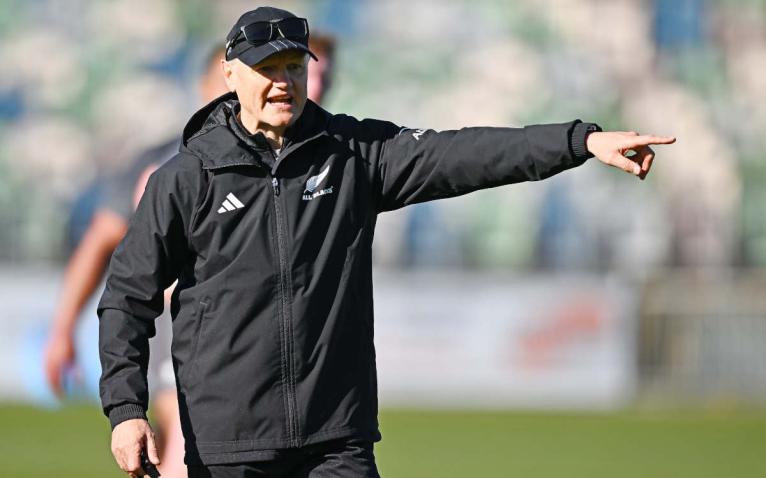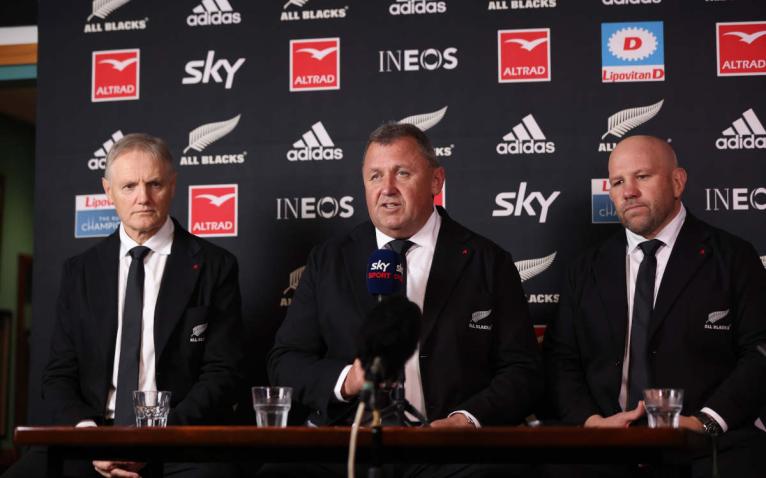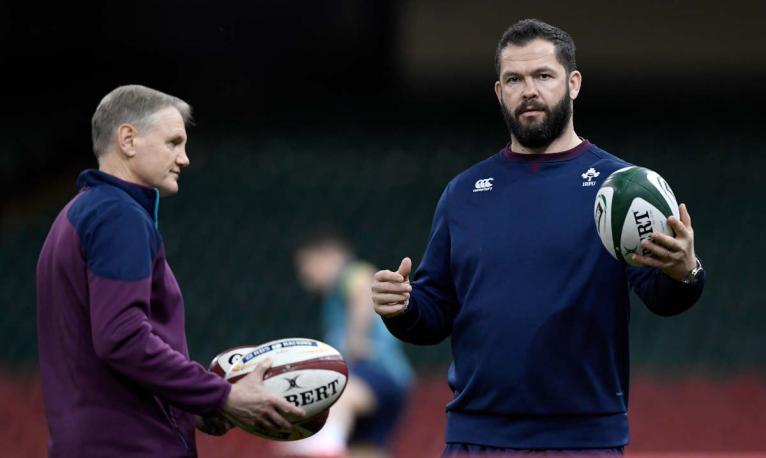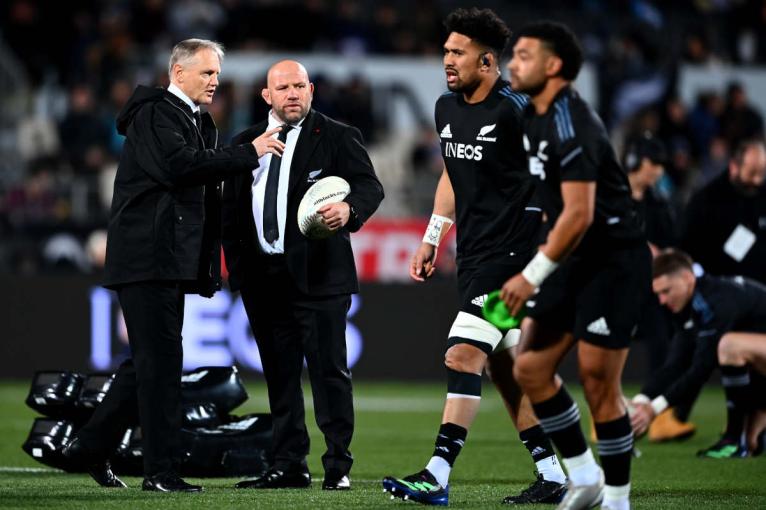The sun is fighting the chill of winter. A shower has fallen, dampening the pavements, emptying the streets. July in Woodville is like February in Ireland. Summer is far away, stored within the far reaches of your imagination.
This was Joe Schmidt’s home town. We passed the fields he played on as a child, tried to figure out the location of the tree nursery he worked in as a teenager, and spotted the local racecourse where he worked as a runner.
However, spotting a human on this dank Wednesday afternoon proves to be a lot more challenging as the majority of Woodville’s shops had closed for the day. A road sign said we were 170km from Wellington but it took a bit more reading to discover the person who was voted world coach of the year in 2018 was one of eight children raised in this picturesque place.
“As a teenager, I wanted to have the opportunity to go on tour to Australia with our (school) first XV rugby team so I had to supply that money,” Schmidt told The Sunday Independent’s Brendan Fanning in an interview some years back. “Mum and dad were working but they weren’t on flash money or anything. All the kids worked and did different things.”
That quote reminded you of a scene from the Netflix series Better Call Saul when Kim Wexler, an aspiring lawyer, was asked in a job interview what she was looking for when she left small-town Kansas for Albuquerque, New Mexico’s largest city.
“More,” was her one word reply.

You wonder if something similar drove Schmidt, this desire to explore a world beyond his childhood confines, one that took him to university in a bigger city, then overseas as a 24-year-old for a year’s coaching in Mullingar, before he returned home to make a career, first in education, then in coaching.
The danger of painting this kind of image is to suggest Woodville is a forgotten place. It’s not. After winning the grand slam with Ireland in 2018, Schmidt referenced the town he grew up in.
He was standing outside the Twickenham dressing room as he did so. “I used to watch the Five Nations on TV as a kid,” Schmidt said. “These places were on a whole different planet with these massive crowds. It’s pretty hard [to picture] when you’re born in Kawakawa, 1,400 people and you’re shifted to the metropolis of Woodville – 1,600 people. So, this is huge. Huge.”
On the day we visit you don’t see next or near 1,600 people.
The one coffee shop that was open on that late afternoon treats us to tea, a scone and a chat.
The proprietor is engaging, intrigued by the presence of a couple of Irish people on a winter Wednesday in Woodville. It is three days before the deciding Test of the 2022 series between New Zealand and Ireland.
This weekend in Paris, when 80,000 fans pack into the Stade de France, and an audience of millions tune in from around the world, a former resident of Woodville will, in many ways, be way more influential than anyone else in the stadium. Meet Joe Schmidt.
We visited the town’s museum where a charming woman told us she used to play cards once a week with Schmidt’s late mother. She suggested we look around the museum where the town’s history was neatly explained. One section told the story of rugby in Woodville. The first game being played here in 1887. “Sadly there is no rugby team in Woodville today,” we read.
And yet this weekend in Paris, when 80,000 fans pack into the Stade de France, and an audience of millions tune in from around the world, a former resident of this place will, in many ways, be way more influential than anyone else in the stadium.
Meet Joe Schmidt.
Now New Zealand’s attack coach, Schmidt’s impact with the All Blacks can be seen in their results.

The week we visited Woodville was one of the darkest weeks of their recent history, a fourth defeat from five leading to Ian Foster being questioned, not once or twice, but three times about his future in the post-match interview. As All Blacks coach he had overseen New Zealand’s worst run of results since 1998 and it was uncomfortable – as an outsider – to be in that Press conference as Foster, a man who had always treated the Irish media with respect, was put through the wringer.
But he held his cool and held onto his job. New Zealand have won the Rugby Championship twice since that series. They then took a trimming from the Springboks prior to this World Cup starting, lost to France on the opening night, but have racked up some big scores since. Schmidt, the man with an obsessive attention to detail, high intellect and visionary plays, has made a difference.
They’re a better side than they were since July 2022, and a chief reason for that is Schmidt’s addition to the coaching ticket.
He’s the one who made us believe that we could beat New Zealand. The biggest thing he did was to show us the standards that are required day in, day out because you don’t come together, turn up on a Monday and suddenly beat the All Blacks at the weekend. It takes years.Johnny Sexton
Remember Ireland had never beaten the All Blacks until 2016, when Schmidt designed a gameplan that did the trick.
A further victory over New Zealand followed in 2018 and by this stage, Schmidt was well on his way to the World Rugby coach of the year prize, Ireland en route to their first ever No.1 world ranking.
Ultimately 2019 proved to be a massive hangover after the party. The All Blacks would enact revenge, dreams of a World Cup final ending two stages earlier. Yet while Schmidt left on a low note, his legacy in Ireland is secure, four trophies with Leinster preceding the three Six Nations titles he’d later win with the national side.
“He’s the one who made us believe that we could beat New Zealand,” said Johnny Sexton. “I think the biggest thing he did was to show us the standards that are required day in, day out because you don’t come together, turn up on a Monday and suddenly beat the All Blacks at the weekend. It takes a couple of years.”

The transformation came down to coaching.
Sexton used to say he went into games with two voices in his head, his own and Joe Schmidt’s. Former Ireland winger, Andrew Trimble, meanwhile, compared Schmidt to Mr Miyagi from The Karate Kid. “The thing about Joe is that he left you in absolutely no doubt about what needed to happen. In defence, if you switched off, he’d give you a hard time. When that first happened, I thought, ‘this guy doesn’t rate me’. But that’s the Mr Miyagi effect. I was being shaped, moulded into the type of winger he wanted and I didn’t even realise I was taking the type of feedback on board that he wanted me to take.”
Watching all this unfold was a sports psychologist called Enda McNulty who Schmidt brought with him from Leinster into Ireland.
“What was unique about that All Blacks win in 2016 was that it was actually a normal week,” says McNulty. “We didn’t spend the days leading up to the game discussing 111 years of losing to New Zealand, getting tangled up in history. It was all about staying in the moment. Our message was: ‘win the next moment, don’t think too far ahead; don’t think about the past, take the All Black mystique away’. We kept it simple.”
There’s two things to say about Joe. One, he is the best rugby coach in the world, a tactical genius. Secondly, when you talk about Joe and his understanding about psychology, Joe has as deep an understanding of people as anyone.
Enda McNulty
Schmidt’s mental gameplan had been finalised with McNulty six weeks prior to Chicago over a three-and-a-half hour chat. The tactical strategy, McNulty says, was drawn up way earlier. “About two or three years beforehand,” he explains. “After 2013 (when Ireland lost to New Zealand in the last play of the game) he figured out what Ireland had to do to beat them.
“And he drilled it into the players relentlessly.
“There’s two things to say about Joe. One, he is the best rugby coach in the world, a tactical genius.
“Secondly, when you talk about Joe and his understanding about psychology, Joe has as deep an understanding of people as anyone. His reading is extensive; the best coaches tend to be like that. You think about Phil Jackson, the former Chicago Bulls and LA Lakers coach. Joe is on the same level as Jackson in terms of the transformative effect they have had on their sports.

“In terms of his psychological understanding of the players, the best thing Joe did, both in his Leinster era, and also his Ireland one, was giving them absolute clarity and confidence. They’d regularly have said to me they were confident they had the best coach in the world.”
Now New Zealand have him.
And that’s a big concern for Ireland to deal with ahead of this quarter-final.
Here’s Bernard Jackman, the former Ireland hooker, speaking on the World Rugby podcast this week. “Joe’s influence is massive,” said Jackman. “He has made them better. His primary area is first phase strike attack and that has been unbelievable for them.
Joe knows the Ireland players inside out. He is an encyclopaedia of knowledge. He has a phenomenal rugby brain and his area is to hurt Ireland off set piece. So even though Ireland’s defence has been really good, there is bound to be a weakness there.
Bernard Jackman
“The All Blacks used to be a team who hurt you on transition and they still can do that. But even against France in the first game, they had three launches that hurt the French. So that detail is something Ireland will have to contend with.
“Then there is the fact that Joe knows the Ireland players inside out. He is an encyclopaedia of knowledge. He has a phenomenal rugby brain and his area is to hurt Ireland off set piece. So even though Ireland’s defence has been really good, there is bound to be a weakness there. What if Ireland concede early? Their confidence will be hit and they will be chasing the game. Joe Schmidt is a huge player in this game.”


All tries in the 1st half scored by New Zealanders
Yeah... players elegibility for world rugby is a joke...
Can't believe how disrespectful the irish crowd were during the hakka, more akin to soccer fans
Schmidt is a nice guy. A school teacher. Farrell is a different beast. A "tough" "Tell it as it is" Straight Shooter" who is nothing like a school teacher, who appeals to tough Front Row forwards.
Robertson will change All Black Rugby. Schmidt has failed in that regard. Robertson "Stood up" and dared to disagree with the NZRFU. Graham Henry single handed, blocked him as All Black Coach. Graham Henry is a Headmaster/Control freak.
The NZRFU gave it to Foster as "They could control him" and they did"
A recent review of the NZRFU described the NZRFU " as not fit for purpose" The great Graham Mourie was on that panel of three. Just Google NZRFU Review 31/08/2023.
They have been woeful "Managers of Money" and had to be bailed out by a group of 'Greedy American Billionaires"
Then we had the "ALTRAD" deal. One would have to ask, who got the $300K backhander from the Slippery Syrian.
Joe Schmidt will probably go back to Ireland and have some sort of role as an advisor. His style doesn't resonate here.
Ireland have some "geniuses" to chose from and they will get stronger and stronger
WTF random .... random WTF
Well, this comment has sure been put in its place. So much for Joe having no influence. 😉
And how do you know joe is a nice guy?
Please name the geniuses from Ireland?
Farrell is from England. And half their team isn’t even Irish.
Ireland is like a Baa Baas team.
You guys are getting very excited over there. Prematurely. There are exercises one can do to help that problem.
NZ by 10 points.
Spot on. Stand by for Schmidt's plan. Ireland are excellent, but I think they are going to struggle to win this one.
Nice piece about Joe, but I think we should agree to disagree. I have a Kiwi mate who thought that Joe would be their saviour. Not really sure that's happened. Look obviously Joe can coach, but Joe was in charge of the World Number One team in 2019. I think Argentina beat them in the Quarterfinals. Joe was also on the coaching staff the last two months when the All Blacks were well beaten by France. Then two weeks prior he was present when the All Blacks suffering the biggest loss in a 100 year history of the game against the Boks. He has to be accountable to making the All Blacks seem less invincible as it's happened on his watch. As a neutral I watched Ireland destroy Scotland and I said to myself, this is the best team on the planet. Okay so maybe Joe got Ireland to certain level, but Farrell has taken them to the next level. As a neutral I fully expect Ireland to win comfortably on Saturday.
Is your kiwi mate Jeff Wilson?
Because then it must be true.
A lot of people leaning heavily on the card skewed pre tournament warm up game at Twickenham. Ireland have never won comfortably against the ABs. The ABs on the other hand have beaten Ireland comfortably many times, most recently in 2022.
The man's influence on Irish Rugby is legendary. There are many people so effected by the PTSD of 2019 that the previous 6 years have been forgotten. 3 championships, including a grand slam and a first series win in Australia since the 1970s. He helped to clear most of the anxiety and doubt that was ingrained in Irish players handed down through generations.
But the most important change made under Joe was that he ended the nonsense of the amateur board influence. Every coach up to Declan Kidney had to present their match day squads to a glorified selection committee, made up of men (no women) perpetually voted in by clubs around the country. Every coach had to explain their decisions. Joe ended this practice as he told them he wouldn't take the job unless it stopped.
He has helped drag the IRFU not just into rugby's modern era, but to the fore of it.
In forty-four hours, I will look back at this article and it will be one of two things... either brilliantly insightful or wistful thinking.... :)
Dave
Maybe you went straight to the comments without reading the article, but I cannot see the insight or wistful thinking that you are referring to.
It is literally an article about Joe Schmidt's background. The game is only reference in the last 3 paragraphs in how his influence might hurt Ireland.
wistful thinking? You didnt note hes an Irishman?
I just thought it was a lovely piece. We don't have skilled writers down here.